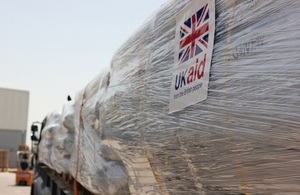Syria refugees: UK government response
Updates on how the UK government is helping to address the Syrian refugee situation.

Trucks carrying aid for Syria refugees
In the first 6 months of 2015, more than 220,000 people were detected crossing the Mediterranean to Europe. Many of these are fleeing the conflict in Syria: the conflict has killed over 220,000 and forced more than 11 million to flee their homes.
The UK government is taking part in the UN’s programme to resettle refugees who have fled from their home countries, including those affected by conflict or civil war.
Since 2011, the UK has granted humanitarian protection to almost 5,000 Syrians through our normal asylum procedures. A further 216 people have been relocated under the Syrian Vulnerable Persons scheme so far.
The Prime Minister announced on 7 September that the UK would accept up to 20,000 Syrian refugees over the next 5 years.
Aid
The UK is the second largest bilateral donor to the Syria crisis. The Prime Minister announced a further £100 million on 4 September and an additional £115 million at an emergency meeting of the European Council on 23 September. This takes our total contribution to £1.12 billion since 2012 to help vulnerable people in Syria and refugees in the region.
In addition, DFID has allocated £9.5 million from the UK Conflict, Stability and Security Fund to support local capacity and build longer term stability. Our support is reaching millions of people and has saved lives in Syria, Jordan, Lebanon, Turkey, Iraq and Egypt.
On 14 September the Prime Minister visited Lebanon and Jordan to see the impact of UK aid in the region. He also announced the appointment of a new minister to coordinate work across government to resettle Syrian refugees in the UK. as well as new education funding for refugees in Lebanon.
Read a factsheet setting out how funding is being spent or follow https://www.facebook.com/SyriaCrisisUKaid for the latest updates.
Helping Syrian refugees
Alongside the normal asylum process, the UK government operates 3 resettlement programmes in partnership with the United Nations High Commissioner for Refugees (UNHCR): Gateway, Mandate and the Syrian Vulnerable Persons scheme.
Video: Justine Greening on the response to the Syrian and refugee crisis
Justine Greening: The UK’s response to the Syrian and wider refugee crisis
Audio courtesy of the BBC World at One.
Syrian Vulnerable Persons scheme
Launched in January 2014, the Syrian Vulnerable Persons scheme is the first resettlement programme run by the UK to target support for refugees specifically on the basis of their vulnerability. We have taken 216 people to date under the scheme, which is based on need rather than fulfilling a quota.
Gateway
Gateway, together with UNHCR, is one of the oldest and largest resettlement programmes in the EU. The current commitment is to resettle 750 refugees per year – usually people who have been displaced for more than 5 years.
Mandate
Mandate has operated since 1995. It’s designed to resettle individual refugees from anywhere in the world if they:
- have been recognised as refugees by UNHCR, and judged by them to be in need of resettlement
- have a close family member in the UK who is willing to accommodate them
Other support in the region
Britain will also continue to work with partners to address the conflict in Syria. This includes providing support to the region and tackling the criminal smuggling gangs that are exploiting vulnerable migrants.
HMS Enterprise remains in the Mediterranean alongside the Border Force cutters and together with HMS Bulwark, they have now rescued more than 6,700 people.
The Prime Minister said:
Britain will act with our head and our heart, providing refuge for those in need while working on long term solutions to this crisis. As I said earlier in the week, that means bringing to an end to the conflicts that are driving so many to flee, including the bloodbath that has engulfed Syria.
Updates to this page
-
Updated total funding details.
-
Added link to 'Syria refugees: how you can help'.
-
Updated to include details of the Prime Minister's visit to see how UK aid is helping refugees.
-
Added link to a statement made by the Prime Minister in the House of Commons on 7 September.
-
First published.